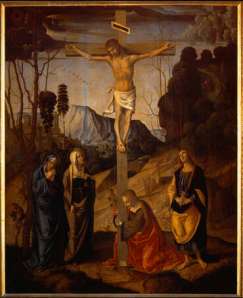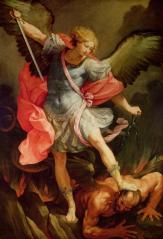What Will the Church Look Like?
[T]he big talk of those who prophesy a Church without God and without faith is all empty chatter. We have no need of a Church that celebrates the cult of action in political prayers. It is utterly superfluous. Therefore, it will destroy itself. What will remain is the Church of Jesus Christ, the Church that believes in the God who has become man and promises us life beyond death. The kind of priest who is no more than a social worker can be replaced by the psychotherapist and other specialists; but the priest who is no specialist, who does not stand on the sidelines, watching the game, giving official advice, but in the name of God places himself at the disposal of men, who is beside them in their sorrows, in their joys, in their hope and in their fear, such a priest will certainly be needed in the future.
Let us go a step further. From the crisis of today the Church of tomorrow will emerge – a Church that has lost much. She will become small and will have to start afresh more or less from the beginning. She will no longer be able to inhabit many of the edifices she built in prosperity. As the number of her adherents diminishes, so will she lose many of her social privileges. In contrast to an earlier age, she will be seen much more as a voluntary society, entered only by free decision. As a small society, she will make much bigger demands on the initiative of her individual members. Undoubtedly she will discover new forms of ministry and will ordain to the priesthood approved Christians who pursue some profession. In many smaller congregations or in self-contained social groups, pastoral care will normally be provided in this fashion. Alongside this, the full-time ministry of the priesthood will be indispensable as formerly. But in all of the changes at which one might guess, the Church will find her essence afresh and with full conviction in that which was always at her center: faith in the triune God, in Jesus Christ, the Son of God made man, in the presence of the Spirit until the end of the world. In faith and prayer she will again recognize her true center and experience the sacraments again as the worship of God and not as a subject for liturgical scholarship.
The Church will be a more spiritual Church, not presuming upon a political mandate, flirting as little with the Left as with the Right. It will be hard going for the Church, for the process of crystallization and clarification will cost her much valuable energy. It will make her poor and cause her to become the Church of the meek. The process will be all the more arduous, for sectarian narrow-mindedness as well as pompous self-will will have to be shed. One may predict that all of this will take time. The process will be long and wearisome as was the road from the false progressivism of the eve of the French Revolution – when a bishop might be thought smart if he made fun of dogmas and even insinuated that the existence of God was by no means certain – to the renewal of the nineteenth century. But when the trail of this sifting is past, a great power will flow from a more spiritualized and simplified Church. Men in a totally planned world will find themselves unspeakably lonely. If they have completely lost sight of God, they will feel the whole horror of their poverty. Then they will discover the little flock of believers as something wholly new. They will discover it as a hope that is meant for them, an answer for which they have always been searching in secret.
And so it seems certain to me that the Church is facing very hard times. The real crisis has scarcely begun. We will have to count on terrific upheavals. But I am equally certain about what will remain at the end: not the Church of the political cult, which is dead already with Gobel, but the Church of faith. She may well no longer be the dominant social power to the extent that she was until recently; but she will enjoy a fresh blossoming and be seen as man’s home, where he will find life and hope beyond death.
– Fr. Joseph Ratzinger, Christmas, 1969 (from Joseph Cardinal Ratzinger/Pope Benedict XVI, Faith and the Future, San Francisco, CA: Ignatius Press, 2006)










Truths of the Catholic Faith
Posted in Commentary, Theology, tagged Baptism, Catholic, Eucharist, Faith, God, Hail Mary, Holy Trinity, Ignorance, Incarnation, Jesus, Lord's Prayer, Prayer, Precepts of the Church, Prenance, Redemption, Sacraments, Truths on March 18, 2012| Leave a Comment »
Image: Wikimedia Commons
From the Roman Catholic Daily Missal, 1962:
Among the truths which faith teaches us, there are several which all ought to know and believe explicitly, namely, the existence of God; the Mystery of the Holy Trinity; the Mystery of the Redemption of mankind by the Incarnation and death of Jesus Christ, and the future state of reward and punishment.
There are things which every Catholic is also bound to know by the express command either of God or of the Church. These things are: 1.) The three most ordinary Catholic prayers, namely, the Lord’s Prayer, the Hail Mary, and the Apostles’ Creed; and also, at least in substance, 2.) The Commandments of God; 3.) The Precepts of the Church; 4.) The Doctrine of the Sacraments, and especially of these three which are necessary to everyone, namely, Baptism, Penance, and the Holy Eucharist; 5.) The duties and obligations of one’s state in life.
It is a mortal sin for a Catholic to be ignorant of these things, if it be through his own willfulness or neglect.
Share this:
Read Full Post »